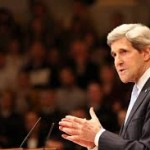By Joshua Miller
The Islamic Republic’s News Agency (IRNA) declared today that Iran has stopped enriching uranium to 20%.
Hossein Naghavi Hosseini, the spokesman for the national security and foreign policy parliamentary commission (NSFP) indicated “Tehran has stopped enriching uranium to a level of purity higher than 5 percent,” because “Iran possesses a sufficient amount of 20%-enriched uranium for conversion into fuel for its research reactor in Tehran.”
Iran’s decision to halt uranium enrichment has ostensibly followed in line with the recent P5+1 talks that have been marked with considerable success between the West and Iran. However, this move has not assuaged the fears of the US Congress or many of the other regional allies of the United States like Saudi Arabia and the Persian Gulf monarchies. In fact, these allies have expressed considerable dismay over U.S. suggestions that Iran could possess limited enrichment capability in exchange for sanctions relief.
Secretary of State, John Kerry and other administration officials have indicated that Iran must include a combination of stringent curbs on its nuclear activities and a close monitoring system to ensure a deal can be struck. Kerry noted that the administration would continue to pursue the diplomatic initiative with Iran, but that the Islamic Republic would have to prove its peaceful intent through its actions to receive any relief from the crippling economic sanctions being imposed upon it.
Some critics argue that Iran possesses no inherent need to make its own nuclear fuel due to the access it has to purchase it from other countries. Regardless of this argument, Iran has vigorously pursued the development of its nuclear program since its inception, and many times before has declared it will continue to do so regardless of the actions of others. The nuclear program for Iranians embodies more than its ostensible purpose of attaining its peaceful energy needs; it is a pillar of Iranian society that symbolizes Iran’s autonomy from the influence of other countries, especially from the West since the coup d’état of 1954 and the Islamic revolution of 1979 – which has been continually fought and died for.
Approaching Iran in a dictatorial manner, one that provides no negotiation room for the Iranians will only further entrench the anti-western sentiment of the Iranian hardliners and expedite the Iranian nuclear program – increasing the chance of a military confrontation. In addition, Iranians would be able to claim that they have given considerable effort to the diplomatic negotiations, to only be given an ultimatum in return for its acquiescence. This would further erode international backing of the West’s sanctions, rendering Iran in a more positive light.
Ultimately, the diplomatic negotiations between the West and Iran should be dictated by Iran’s nuclear “breakout” capability – defined as having produced a sufficient quantity of highly-enriched uranium to fuel a weapon. One report released Wednesday by independent nuclear experts concluded that restrictions on the Iranian nuclear program, such as close monitoring, frequent and random inspections, and a cap on the uranium stockpile could protract Iran’s nuclear “breakout” capability to a period of time that would be sufficient for a preemptive response.
The United States must stand resolute with its policy objective for the Iranian nuclear program – to preclude Iran’s ability from obtaining a nuclear weapon. The means by which the U.S. can achieve its objective are contingent upon Iran assenting to the aforementioned conditions; in exchange, Iran receives sanctions relief. This is the most pragmatic approach for the United States and Iran as both sides get what they want – America attains its most salient objective while Iran preserves its program.
The post Iran’s enrichment to 20% halted appeared first on American Security Project.



